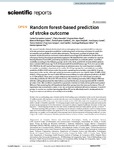Random Forest-Based Prediction of Stroke Outcome

Use this link to cite
http://hdl.handle.net/2183/28159Collections
- Investigación (FIC) [1685]
Metadata
Show full item recordTitle
Random Forest-Based Prediction of Stroke OutcomeAuthor(s)
Date
2021Citation
Fernandez-Lozano, C., Hervella, P., Mato-Abad, V. et al. Random forest-based prediction of stroke outcome. Sci Rep 11, 10071 (2021). https://doi.org/10.1038/s41598-021-89434-7
Abstract
[Abstract] We research into the clinical, biochemical and neuroimaging factors associated with the outcome of stroke patients to generate a predictive model using machine learning techniques for prediction of mortality and morbidity 3-months after admission. The dataset consisted of patients with ischemic stroke (IS) and non-traumatic intracerebral hemorrhage (ICH) admitted to Stroke Unit of a European Tertiary Hospital prospectively registered. We identified the main variables for machine learning Random Forest (RF), generating a predictive model that can estimate patient mortality/morbidity according to the following groups: (1) IS + ICH, (2) IS, and (3) ICH. A total of 6022 patients were included: 4922 (mean age 71.9 ± 13.8 years) with IS and 1100 (mean age 73.3 ± 13.1 years) with ICH. NIHSS at 24, 48 h and axillary temperature at admission were the most important variables to consider for evolution of patients at 3-months. IS + ICH group was the most stable for mortality prediction [0.904 ± 0.025 of area under the receiver operating characteristics curve (AUC)]. IS group presented similar results, although variability between experiments was slightly higher (0.909 ± 0.032 of AUC). ICH group was the one in which RF had more problems to make adequate predictions (0.9837 vs. 0.7104 of AUC). There were no major differences between IS and IS + ICH groups according to morbidity prediction (0.738 and 0.755 of AUC) but, after checking normality with a Shapiro Wilk test with the null hypothesis that the data follow a normal distribution, it was rejected with W = 0.93546 (p-value < 2.2e−16). Conditions required for a parametric test do not hold, and we performed a paired Wilcoxon Test assuming the null hypothesis that all the groups have the same performance. The null hypothesis was rejected with a value < 2.2e−16, so there are statistical differences between IS and ICH groups. In conclusion, machine learning algorithms RF can be effectively used in stroke patients for long-term outcome prediction of mortality and morbidity.
Keywords
Medical research
Stroke
Stroke
Editor version
Rights
Atribución 4.0 Internacional
ISSN
2045-2322






